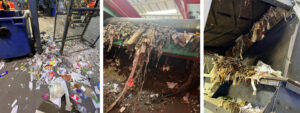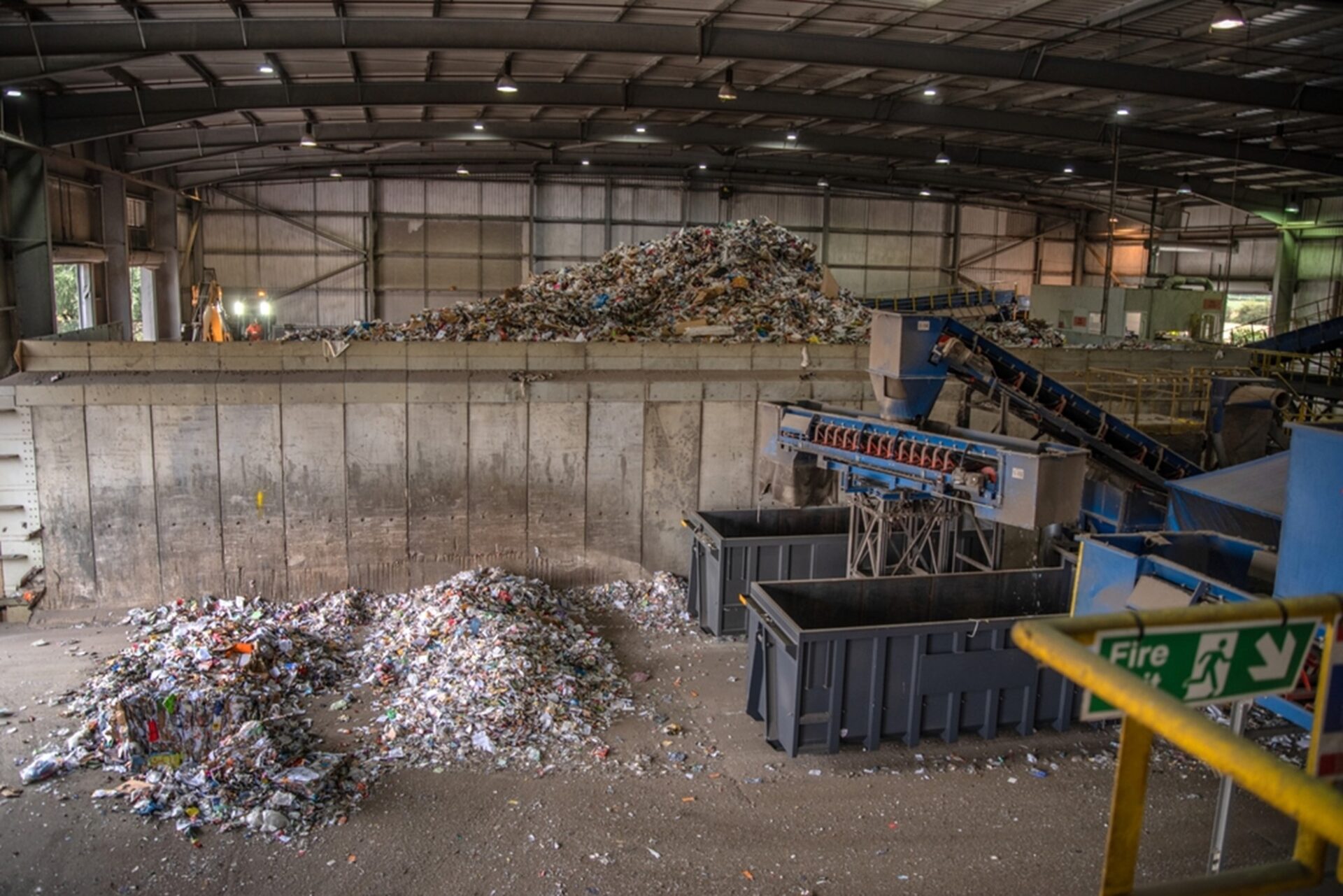Materials Recovery Facilities (MRFs), sometimes called material recycling or reclamation facilities, sit between our waste and the value extracted from the reuse and recycling of that waste. Safety, quality, and productivity are the three components that maximise waste and recycling facility efficiency. MRF operators can do plenty to make their operations more efficient and safer.
Matthew Beverley, Chairman at Hoverdale UK and Vice President of the MHEA (Materials Handling Engineers Association), looks at the health & safety considerations for MRF operators and the implications from spillage and carryback in waste & recycling processing facilities.
The UK has been a global leader in waste management and recycling initiatives, striving to achieve a circular economy by reducing waste, maximising recycling, and minimising the disposal of waste to landfill. However, the activities and operations carried out in these facilities pose various health and safety considerations and issues, affecting the employees, the public, and the environment.
Guidance developed by the Waste Industry Health and Safety (WISH) Forum to help control safety and health risks in the waste management industry associated with safely designing and operating material recovery facilities (MRFs). The guidance advises on material recovery facilities’ leading health, safety and welfare issues. The guidance is primarily aimed at designers/manufacturers, installers and users involved in developing and operating MRFs. It explains how to remove or reduce critical general health and safety risks associated with designing and operating an MRF. It includes advice about assessing hazards and provides solutions that will help eliminate or reduce the risk of serious injury or ill health. It’s not only health and safety risks that need to be considered.
Many materials processed at recycling facilities can be dangerous, such as chemicals, e-waste, batteries, and medical waste. Exposure to these materials can lead to respiratory problems, skin irritation, and other health issues. Proper employee training, personal protective equipment (PPE), and adequate ventilation are essential to minimise exposure to hazardous materials.
Fire Safety – Fires are a significant risk in waste and recycling facilities due to the flammable nature of many materials processed, such as paper, plastics, and chemicals. There have been several incidents of fires at recycling facilities in the UK recently. Adequate fire safety measures, including fire detection and suppression systems, regular fire risk assessments, and employee training, are essential to prevent and manage fires. Accumulating combustible materials, such as paper and plastics, around the conveyor system can increase the fire risk. Regular cleaning and removal of accumulated materials and adequate fire safety measures are necessary to minimise this risk.
Machinery and Equipment Safety – Machinery and equipment used in waste and recycling facilities, such as balers, compactors, and conveyors, pose risks of injury due to entrapment, crushing, and other mechanical hazards. Proper maintenance of equipment, adequate safety guards, and training for employees on safe operation are crucial to minimise these risks. Planned and preventative maintenance schedules should be in place.
Noise Pollution – Machinery and equipment used in waste and recycling facilities can generate high levels of noise, leading to hearing loss and other health issues for employees and affecting the surrounding community. Noise control measures, such as noise barriers, acoustic enclosures, and hearing protection, are essential to minimise noise pollution.
Biological Hazards – Waste and recycling facilities can also expose workers to biological hazards in organic and medical waste, such as bacteria, viruses, and fungi. Proper hygiene practices, vaccination, and the use of PPE are essential to minimise exposure to biological hazards.
Carryback and Spillage from Conveyor Belts in MRFs lead to additional risks.
Carryback and spillage from conveyor belts are common in recycling facilities, contributing to several health and safety implications. Carryback refers to the material that sticks to the conveyor belt and is carried back along the return side of the belt. Spillage refers to the material that falls off the conveyor belt during transportation. Both carryback and spillage can lead to the accumulation of material around the conveyor system, creating hazards.
Spillage on the facility floor and gangways causes a health and safety hazard and requires frequent additional clean-up and resources. When the material becomes airborne, site workers may be exposed to potential workplace injuries and respiratory diseases.
Slips, Trips, and Falls – Accumulation of spilt material on the ground can create an uneven surface and increase the risk of slips, trips, and falls for employees working around the conveyor system. Regular cleaning and maintenance of the area around the conveyor belts are necessary to minimise this risk.
Dust Generation – Carryback and spillage can lead to increased dust generation, affecting air quality and posing respiratory hazards to employees. Dust may also contain harmful substances, such as silica, commonly found in construction and demolition waste and can lead to silicosis, a severe lung disease. Proper dust control measures, such as dust extraction systems, water suppression systems, and respiratory protective equipment, are essential to minimise exposure to dust and silica.
Equipment Damage and Breakdown – Carryback and spillage can lead to the accumulation of material on the conveyor components, such as rollers, pulleys and belly pans, leading to increased wear and tear, equipment damage, and breakdowns resulting in costly repairs and downtime.
Manual Handling Risks – Cleaning up carryback and spillage often involves manual handling of materials, cleaning, and digging out materials, leading to musculoskeletal disorders, such as back pain and repetitive strain injuries. Proper workstation design, mechanical aids for lifting and moving materials, and training on safe manual handling techniques are necessary to minimise these risks.
Carryback and spillage from conveyor belts in recycling facilities pose several health and safety implications, including slips, trips, falls, dust generation, fire hazards, equipment damage, and manual handling risks. Adequate training, regular maintenance and cleaning, and the implementation of safety measures and controls are essential to minimise these risks and ensure the safety and health of employees. By eliminating carryback and spillage, the conveyor belts and rollers can be kept clean and material-free, reducing health and safety risks. Our MRF customers always strive for continuous improvement for the most efficient facility. They won’t substitute safety or quality to keep lines running. If you run an MRF safely, the facility will naturally be more efficient.

For more info on preventing carryback and spillage in MRFs, Contact Us for a FREE SITE SURVEY.
This article originally appeared in the September Issue of Tomorrow’s FM – Health & Safety Feature.





